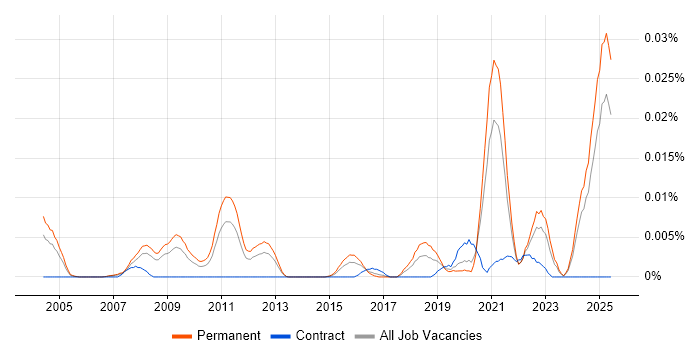Quantitative Finance (Mathematical Finance)
UK > UK excluding London
The table below provides summary statistics and salary benchmarking for jobs advertised in the UK excluding London requiring Quantitative Finance skills. It covers permanent job vacancies from the 6 months leading up to 9 January 2026, with comparisons to the same periods in the previous two years.
| 6 months to 9 Jan 2026 |
Same period 2025 | Same period 2024 | |
|---|---|---|---|
| Rank | - | 565 | - |
| Rank change year-on-year | - | - | - |
| Permanent jobs citing Quantitative Finance | 0 | 8 | 0 |
| As % of all permanent jobs in the UK excluding London | - | 0.022% | - |
| As % of the Processes & Methodologies category | - | 0.025% | - |
| Number of salaries quoted | 0 | 7 | 0 |
| Median annual salary (50th Percentile) | - | £77,500 | - |
| UK median annual salary | £91,250 | £90,000 | £105,000 |
| % change year-on-year | +1.39% | -14.29% | +2.44% |
All Process & Methodology Skills
UK excluding London
Quantitative Finance falls under the Processes and Methodologies category. For comparison with the information above, the following table provides summary statistics for all permanent job vacancies requiring process or methodology skills in the UK excluding London.
| Permanent vacancies with a requirement for process or methodology skills | 33,312 | 32,109 | 29,712 |
| As % of all permanent jobs advertised in the UK excluding London | 78.70% | 88.77% | 88.63% |
| Number of salaries quoted | 19,114 | 14,485 | 22,061 |
| 10th Percentile | £27,750 | £31,250 | £28,500 |
| 25th Percentile | £33,250 | £41,250 | £38,000 |
| Median annual salary (50th Percentile) | £50,000 | £55,000 | £52,500 |
| Median % change year-on-year | -9.09% | +4.76% | -4.55% |
| 75th Percentile | £65,000 | £70,000 | £66,750 |
| 90th Percentile | £80,000 | £83,750 | £80,000 |
| UK median annual salary | £55,000 | £60,000 | £60,000 |
| % change year-on-year | -8.33% | - | -4.00% |
Quantitative Finance
Job Vacancy Trend in the UK excluding London
Historical trend showing the proportion of permanent IT job postings citing Quantitative Finance relative to all permanent IT jobs advertised in the UK excluding London.

Quantitative Finance
Salary Trend in the UK excluding London
Salary distribution trend for jobs in the UK excluding London citing Quantitative Finance.

